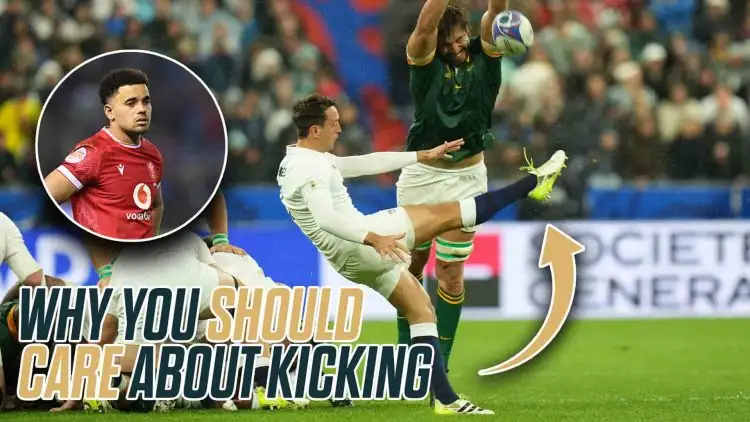Alex Mitchell box kicks during the World Cup match against the Springboks with the caption: ‘Why you should care about kicking’
Alex Mitchell box kicks during the World Cup match against the Springboks.
Ahead of the final round of the Six Nations, Sam Larner puts the boot to the stigma around kicking in rugby with his latest analysis.
Corners stone of success
It won’t be a surprise to hear that lots of people don’t like kicking in rugby. However, it’s a cornerstone of success and if you take the time to understand the interplay involved in the kick chase and the kick reception the battle becomes far more engaging.
Last November, Australia comprehensively took apart Wales in Cardiff in front of a quiet and apathetic crowd. The only Welsh positive during that match was their aerial dominance, which was the only method through which they generated front foot ball.
On Saturday, Wales played Scotland in Edinburgh in front of travelling fans with a genuine belief that the miserable losing streak would end. Of course that didn’t transpire and a big reason for that was the aerial dominance the Scots displayed in the first half.
Wales couldn’t have exposed that potential weakness at a worse time. They end their Six Nations against England, a team who almost dispatched South Africa in 2023 solely off the back of their kick chase. But what makes a good kick chase and how can Wales adapt?
A good kick chase, of course, starts with a good kick. That’s not our primary focus in this article but the principles are length and hang time. A long kick without sufficient hang time can’t be competed for by the kicking team and becomes a nightmare to defend because the attack have access to the entire pitch.
A kick might have a high hang time, but if that hang time is achieved by belting the ball directly skywards as it barely travels forwards then it’s not effective. The best kick is long enough that it gains territory but with enough hang time that your quick chasers can get underneath it.
The chase isn’t just a mindless sprint and it starts well before the ball is even kicked. In the above example, the Northampton Saints are looking to exit from deep in their own territory. They’ve run a phase before this and they’ve used that time to set-up their kick chase.
Most teams are looking to box kick from near to the 15m line. That gives the scrum-half sufficient leeway to not put the ball directly into touch if they mishit their kick but also allows you to corral the chase into a small area. Most of the action of the kick chase is happening in the channel between the ruck and the sideline.
The Saints then try and go up like a spearhead with the middle player chasing as hard as he can to compete for the ball in the air (pink) and the two players on either side following them and forming a block to collect any ball slapped back in their direction or tackle the opposition if they win the ball.
This is different to the kick chase you might have employed at grassroots or schools rugby. There everyone would go up as quickly as they can and try to pressure the catcher. The downside, as anyone who played like that would remember, is that if you overrun the kick then there’s nobody left in behind to stop the catcher. The new kick chase mitigates that by pressuring the catcher but adding a layer of protection if the chaser can’t get there in time. However, it’s even more detailed than that. It’s quite common for teams to work to get the right combination of chasers into position.
England’s aerial excellence
In England’s case in 2023, they would use Freddie Steward, Jonny May, and Elliot Daly to chase. All three are quick and tall – the perfect mould for a kick chaser. Then Tom Curry, Ben Earl, and Maro Itoje could operate as the protection layer using their pace and physicality to get there in time and then deliver bruising hits or mop up loose ball.
For Super Saturday, there’s no Steward or May but everyone else is still in place. Replacing those two are Tom Roebuck (6’2 and quick) and most likely Tommy Freeman (6’3 and quick). Of course, Marcus Smith is wearing Steward’s shirt but he has a very different role and I wouldn’t expect him to be used as a chaser. Instead, he’ll operate out wide and look to orchestrate the wide attack if England do win the ball back.
For Wales, the challenge is that they’re going to be using a makeshift back three. There’s no Josh Adams, nor Liam Williams, or Tom Rogers. Joe Roberts is the man who is shifted to the wing from his usual centre position but he’s ‘just’ 6ft. England’s mobile back row (Curry x2 and Earl) might suggest dynamic carrying, and fans will be hoping for that, but it might well be an attempt to get to kicks first and turn Wales over once they get there. This is undoubtedly a challenge for Wales but it’s also a challenge for every team in modern rugby who are constantly tasked with diffusing high balls from kickers who keep getting better and better.
